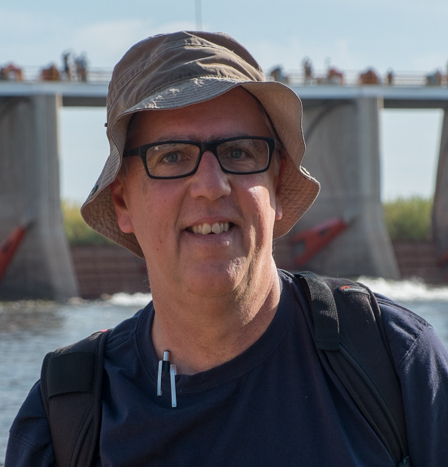Author-in-Residence John Fleck's Publications

John Fleck joined the Utton Center in Fall 2021. He was the director of the University of New Mexico Water Resources Program from 2016-2021, and has been affiliated with the University's water research and teaching programs since 2013. A former science journalist, Fleck spent more than two decades at the Albuquerque Journal, where he wrote about a range of political and policy-relevant science and environmental issues, from nuclear weapons and waste policy to climate change and water. He has written about water since the 1980s. and is an expert in Colorado River management, governance, and he is a proud. member of the Colorado River Research Group.
Contact John Fleck: fleckj@unm.edu | (505) 264-0976
The Tree Rings' Tale, Understanding Our Changing Climate
Available for purchase here at UNM Press.
The science of tree rings--dendroclimatology--had not been developed when John Wesley Powell made his epic voyages down the Colorado River in 1869, 1871, and 1872. Nevertheless he observed that the rising and falling of the river differed over the years and came to understand the important role these variations played in the lives of people trying to live in the West.
While Powell was braving the Colorado River's rapids, a tree in southwestern Colorado was putting on rings. In 1869 it was a modest ring. In 1871, the year Powell returned to begin his second trip, the ring was remarkably thin. In 1872, as the river rose to levels that made it almost impassable, the tree's ring was fat. We know this because, over a century later, paleoclimatologist Connie Woodhouse has studied that tree and many others in the Four Corners region, using the fat and thin rings to estimate how much water has flowed down the Colorado River each year for the past millennium.
The Tree Rings' Tale addresses one of the most important guiding principles for life in the arid West and one that scientists have long recognized: climate variability. Combining classic climatology with oceanography, meteorology, geology, archaeology, and even a touch of astronomy, this exploration offers young scientists a chance to unravel how, over the past 150 years, we have come to learn more about the natural world. Activities included after each chapter provide hands-on experience with some of the very processes scientists use to understand how our world works.
Ages 13 and up
Water is for Fighting Over and Other Myths about Water in the West
PLEASE NOTE, this book is not available for purchase through UNM Press, but can still be purchased here.
"Illuminating." —New York Times, WIRED's Required Science Reading 2016
When we think of water in the West, we think of conflict and crisis. In recent years, newspaper headlines have screamed, “Scarce water and the death of California farms,” “The Dust Bowl returns,” “A ‘megadrought’ will grip U.S. in the coming decades.” Yet similar stories have been appearing for decades and the taps continue to flow. John Fleck argues that the talk of impending doom is not only untrue, but dangerous. When people get scared, they fight for the last drop of water; but when they actually have less, they use less.
Having covered environmental issues in the West for a quarter century, Fleck would be the last writer to discount the serious problems posed by a dwindling Colorado River. But in that time, Fleck has also seen people in the Colorado River Basin come together, conserve, and share the water that is available. Western communities, whether farmers and city-dwellers or US environmentalists and Mexican water managers, have a promising record of cooperation, a record often obscured by the crisis narrative.
In this fresh take on western water, Fleck brings to light the true history of collaboration and examines the bonds currently being forged to solve the Basin’s most dire threats. Rather than perpetuate the myth “Whiskey's for drinkin', water's for fightin' over," Fleck urges readers to embrace a new, more optimistic narrative—a future where the Colorado continues to flow.
Science Be Dammed: How Ignoring Inconvenient Science Drained the Colorado River
PLEASE NOTE, this book is not available for purchase through UNM Press, but can still be purchased here.
Science Be Dammed is an alarming reminder of the high stakes in the management—and perils in the mismanagement—of water in the western United States. It seems deceptively simple: even when clear evidence was available that the Colorado River could not sustain ambitious dreaming and planning by decision-makers throughout the twentieth century, river planners and political operatives irresponsibly made the least sustainable and most dangerous long-term decisions.
Arguing that the science of the early twentieth century can shed new light on the mistakes at the heart of the over-allocation of the Colorado River, authors Eric Kuhn and John Fleck delve into rarely reported early studies, showing that scientists warned as early as the 1920s that there was not enough water for the farms and cities boosters wanted to build. Contrary to a common myth that the authors of the Colorado River Compact did the best they could with limited information, Kuhn and Fleck show that development boosters selectively chose the information needed to support their dreams, ignoring inconvenient science that suggested a more cautious approach.
Today water managers are struggling to come to terms with the mistakes of the past. Focused on both science and policy, Kuhn and Fleck unravel the tangled web that has constructed the current crisis. With key decisions being made now, including negotiations for rules governing how the Colorado River water will be used after 2026, Science Be Dammed offers a clear-eyed path forward by looking back.
Understanding how mistakes were made is crucial to understanding our contemporary problems. Science Be Dammed offers important lessons in the age of climate change about the necessity of seeking out the best science to support the decisions we make.


